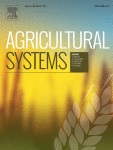Better before worse trajectories in food systems? An investigation of synergies and trade-offs through climate-smart agriculture and system dynamics
CONTEXT
Food systems face multiple challenges simultaneously: provision to a growing population, adaptation to more extreme and frequent climate change risks, and reduction of their considerable greenhouse gas (GHG) emissions. Food system interventions and policies give rise to synergies and trade-offs that emerge over time due to the dynamic nature and interconnections of system elements. Analysis of an entire food system is necessary to identify synergies that bring simultaneous benefits and mitigate trade-offs, both short- and long-term.
OBJECTIVE
Our study aims to inform the sustainable transformation of food systems by identifying short- and long-term synergies and trade-offs in the climate-smart village (CSV) Lawra-Jirapa in northern Ghana under the current practices, technologies, policies, and trends of population growth, extreme events, and climate change impacts.
METHODS
We develop a system dynamics model to simulate the food system in the CSV between 2011 and 2060. We apply the climate-smart agriculture (CSA) approach as a diagnostic tool to the CSV system to reveal the short- and long-term trade-offs and synergies between the CSA goals.
RESULTS AND CONCLUSIONS
The simulation results reveal short-term progress towards the goal of increased productivity and income, with trade-offs in the goals of GHG removal, climate adaptation, and resilience. In the long term, post-2035, current agriculture practices, technologies, and policies inside and outside the CSV boundaries result in trade-offs across all three CSA goals, and progress made towards these goals is reversed. The CSV system behaviour, thus, exhibits a “better before worse” pattern.
SIGNIFICANCE
The analysis demonstrates an approach, which considers simultaneously all three CSA goals, to identify synergies and mitigate trade-offs in an entire food system. The findings suggest that understanding the dynamics of food systems is a precursor to their sustainable transformation. This transformation will entail changes to the food system's goals and structure with equal attention to short- and long-term outcomes.

